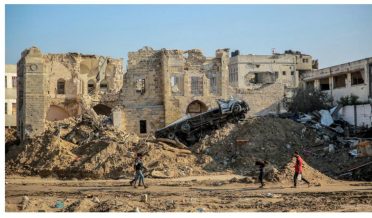(Self- Accountability)
Hold yourselves accountable before you are held accountable.
Muhasaba and scrutiny are the basic doctrines of the Qur’an, relating to answerability on the Day of Judgement.
Allah (SWT) says:
And We will set up a just balance on the day of resurrection, so no soul shall be dealt with unjustly in the least; and though there be the weight of a grain of mustard seed, (yet) will We take account (21:47)
So whoever does an atom’s weight of good will see it, and whoever does an atom’s weight of evil will see it (99:78).
Therefore constant and regular personal and self-accountability in this worldly life is paramount for self-control, staying within boundaries (hudood), improvement, self-development, and transformation to become the best human beings and societies.
Adopting and opting to apply self-accountability to one’s actions before being held accountable on the day of resurrection, is a supreme act in that it assures strengthened faith, God-consciousness with full conviction and above all motivation and sincerity of intention to comply with Allah’s Almighty decrees and live the worldly life according to the purpose for which human beings have been created by the Creator (SWT). Moreover, the approach provides enormous prospects for taking corrective actions and transformation and getting on the righteous path to seek Allah’s (SWT) pleasure.
The best way to prepare to face the challenges and difficulties of a final accounting is that the believer should appraise his deeds in this world before one is imperilled to the account on Allah Almighty’s balance (Mizan). Believers should weigh and examine their deeds themselves preparing for the major accounting. This provides an opportunity for asking questions in this life, making positive changes, and then staying on the right path.
Omar Ibn Al-Khattab, may Allah (SWT) be pleased with him, said:
Hold yourselves accountable before you are held accountable, and weigh them before you are weighed. If it is easier for you in the account tomorrow to hold yourselves accountable today and adorn yourselves for the greatest show, on that day you will be exposed, and no secret of you will be hidden (narrated by ibn Abi Dunya and Ahmed).
There is no doubt that the Day of Judgement is the final day of accountability for mankind’s deeds of life on earth. It is also a fact that after one’s death there is no opportunity to improve upon one’s worldly performance.
Therefore, every living moment should be availed to devise ways and means to account for one’s good and bad deeds. Because Allah (SWT) grants prospects for assessing, scrutinizing, repenting and amending one’s daily routine (mamoolaat) and getting on the right path, to be prepared for accountability on the day of resurrection.
The Holy Qur’an repeatedly warns and reminds us that one day we shall be standing in front of Allah Almighty for our accountability.
Allah (SWT) says:
O you who believe! Fear Allah, and let every soul consider what it has forwarded for the morrow (The Day of Judgement), and fear Allah. Allah is aware of what you do (59:18).
Accountability is an effective tool, which each individual can devise and design according to their inclination and commitment. Readers will note that we are proposing two stages for ‘Accountability (Muhasaba).
(i) Preliminary impact assessment, (Thinking and intending stage) or Pre-Behaviour stage.
(ii) Secondary evaluation –Post Behaviour.
For example, we should impact assess the thoughts that we generate, (or Niyyah ) and scrutinize whether these will have a favourable bearing on the four entities i.e.
i)Whether they will please Allah (SWT)?
ii)Whether they will serve humanity?
iii)Whether appreciate benevolence for the Universe and all the creations, created for the benefit of mankind? and
iv)Whether will help self-examination for remaining within boundaries (hudood)?
To reiterate: these TWO EFFECTIVE STAGES of demonstrating daily accountability (Muhasabah) include:
Stage One: IMPACT ASSESSMENT of four processes or impact categories i.e.
i) Thoughts.
ii) Intentions.
iii) Actions (behaviour), and
iv) Consequences (outcomes).
Across Four entities or areas of safeguard i.e.
1) Seeking Allah’s (SWT) pleasure, by doing always good and refraining from wrong-doing and complying with all the commandments all the time.
2) Serving kinfolks and humanity, and taking care of all the creations.
3) Appreciating, sustaining and protecting the Universe, and
4) Furtherance of self-development to get nearer to Allah (SWT).
Stage One sets the standards for one’s overall conduct from conceiving an idea to considering executing and foreseeing or predicting the consequences or outcomes and reviewing and amending as appropriate.
Stage Two deals with actual assessment, evaluation and accountability after the episode: whether we achieved what we set out to achieve, remaining within boundaries (hudood), defined by Allah (SWT) and advocated by His (SWT) Holy Prophet (SAW).
For example, we take into consideration health conditions when we chose certain food: what to eat, what to avoid if we have heart conditions or diabetes or any other conditions. Why don’t we do that with any prohibitions from Allah (SWT) all the time? Concerning permissible and proscriptions (halal and haram) in ALL situations, in the light of guidance of the Qur’an and Sunnah.
There is a need for impact assessment or evaluation of religiosity, to be done habitually. We should not need pen and paper or fill in any grids or tick checklists but do that routinely as in case of other matters in life. No doubt there are several acceptable and good characteristics and traits that civilised individuals and societies have acquired and evolved over the centuries and tend not to transgress and observe social norms all the time. We realise automatically that certain behaviours are not acceptable; if we do not observe, we knowingly violate and transgress.
Here are some recommended tips to plan, question and evaluate:
1)After every prayer – five times a day. (This will create focus in the prayer as well, instead of rushing around. Evaluation of the process and content of the prayer itself will inculcate an entirely new mindset and lead to transformation.
2)At the end of the day.
3)After any event/discussion/conversation – big or small, good or bad –evaluate against the four areas of safeguards, e.g. whether it was for the pleasure of Allah (SWT) or it would have displeased Him (SWT) and so forth and consider any other dimensions as appropriate.
Accountability drill – the Checklist
The following checklist is by no means all-embracing or exhaustive. One only accounts for what one does or contemplate doing or does. There are individual belief systems, practices and preferences, therefore every individual will need to prepare a tailored-made questionnaire based on their specific routine (mamoolaat) focusing on four strands of faith-inspired safeguard (precautions) or any situation in hand: For example:
(1) Seeking Allah’s (SWT) Pleasure (absolute compliance) with His (SWT) decrees
1) Whether we invoked Allah (SWT) by His beautiful names and attributes to reiterate that there is no other god but Allah(SWT) and had engaged in Zikr i.e. being mindful of Allah’s (SWT) presence all the times and trusted in Him SW) in all matters (7:180) and also attempted to acquire those attributes – (Sibghat – Allah’s (SWT) colour).
2) Whether we put our trust in Him (SWT) all the time and in all matters (65:3).
3) Whether we recognised His (SWT) favours and bounties and praised and thanked Him enough (2:152).
4) Whether we have engaged in seeking forgiveness – for wrong-doing intentionally or unintentionally and amended (66:8).
5) Whether we endeavoured to abstain from forbidden (haram). There should be no haram elements in anything that one consumes, owns or does (7:322-33, 6:119).
6) Whether throughout the day we have been able to beseech Allah (SWT) and continued to supplicate for various purposes (6:43, 9:129) and stayed connected 24/7.
(2) Serving Humanity’s Rights
7) Whether we had been thoughtful and kind to orphans, poor or other needy both within and without family, differently-abled and what have we done to demonstrate that (4:36)?
8) Whether we had been dutiful to our parents (56:15)
(3) Appreciating and caring for the Universe and all the Creations
9) Whether we have been kind, caring, and compassionate to ALL His (SWT) creations (5:2) and fellow human beings.
10) Whether we have been appreciative of all His (SWT) creations and provisions for our benefit (16: 17-19).
(4) Demonstrating self-awareness and development
11) Whether we questioned ourselves before saying or doing anything to check the way, for instance, whether our Holy Prophet (SAW) would have done that – and have shown our love by emulating the Holy Prophet (SAW) (33:21, 3:31).
12)Whether we strived to develop perfect sincerity in our actions and attempted to abandon evil inner-self commands (98:5).
13)Whether we have been preoccupied at all times to purify our soul, our intentions and our deeds and to generate positive and virtuous thoughts, leading to favourable consequences (39:2-3).
14)Whether we avoided occupying ourselves with pointless activities and debauchery and engaging in aimless talks and conversation or any such pursuits (2;82, 4:114, 55:1-4, 23:1-4).
15)Whether we realised that we have been repeating the same mistakes or sins over and over again and sought Allah’s(SWT) forgiveness (3:135-136) and attempted to amend.
16)Whether we continued keeping company with people who could be an undesirable influence or with those who have a positive influence (5:55-57, 25:27-29).
17)Whether we have been inclined to adapt to the company of the pious. This ensures that one simultaneously abstains from an impious company and adopts the company of those who (18:28) remind us of Allah (SWT) and His (SWT) decrees and make us concerned about the hereafter, help us to increase our knowledge and improve our mannerism
18)Whether we have been able to sustain punctuality of routine (mamoolaat) adhering to daily prescribed practices. If one misses them: make a firm resolve and start again. Make a 24-hour timetable to ensure sufficient time is allocated for the performance of mamoolaat. Keep in mind that the recitation of the Qur’an and understanding, comprehending and pondering over it is extremely important (5:1, 19:50, 17:34)
19)Whether we had been capable enough to apply Qur’anic decrees and Sunnah in our mamoolaat. (1:1-7, 16:125).
20)Whether, where possible, we have been able to pray five times Salaah with Jema’at (congregation) in the Masjid (40:102, Muslim:651, Bukhari, Adhan 30)
21)Whether we had been able to keep a connection with a Shaikh (mentor) or any equivalent means or waseela to enhance spirituality and capacity to comply, e.g., through attending the gatherings of ulema, listening to their lectures, TV presentations, and seeking guidance from the Shaikh (mentor) for one’s spiritual enhancement (9:71, 4:64, 5:35, 7:180).
22) Whether (in our conversation) we shouted or spoke politely keeping the voice low (31/19).
23) Whether we always spoke the truth or avoided deceitful and ostentatious words (22/30).
Allah (SWT) created us and specified the purpose for us. So, to live the kind of life prescribed for us we need to refer to the guide and the role model to develop strategies to CONNECT and COMPLY. We all will in the end RETURN to HIM (SWT) and will be accountable for what we were expected to do i.e. did we react within the Hodood (boundaries) or transgressed?
Concluding Remarks
We would like to draw to the readers’ attention that there is an enormous scope to question and evaluate and develop specific checklists. This will assist in self-development as well. Moreover, Accountability orientation in life at each step and phase will lead to the desired transformation.
By way of conclusion, we would like to reiterate the significance of self-accountability during this life, before we are questioned by the Creator.
Allah (SWT) has repeatedly reminded the believers that:
So by your Lord, surely We will question them all (Hijr: 92)
Then surely We will question those (too) who were sent to them (Messengers), and surely We will question the Messengers (7:6).
And (do) not pursue what not you have of it any knowledge. Indeed, the hearing, and the sight, and the heart all those will be [about it] questioned (17:36).
That Allah may requite each soul (according to) what it has earned; surely Allah is swift in reckoning (14:51).
This day every soul shall be rewarded for what it has earned; no injustice (shall be done) this day; surely Allah is quick in reckoning. (40:17)
Then are they sent back to Allah, their Master, the True one; now surely His is the judgment and He is swiftest in taking account (6:62).
The Quranic guidance is always there, if only we ponder over and interpret and apply it as a potent tool for transformation.
For example Allah (SWT) has the beautiful names says the Qur’an:
Allah (SWT) has the most excellent names. So call on Him by His names… (7:180 and 59:24).
Invoking Allah (SWT) by His (SWT) beautiful names, one gets to know Him (SWT) His (SWT) various attributes and powers, – He (SWT) is Merciful (Rahim), it makes one ponder over His (SWT) overall Power and control and commandments that one should acquire those beautiful qualities, traits and attributes, as His (SWT) vice-generant on earth.
Allah (SWT) says:
Say: Take on Allah’s colour. And whose colour is better than Allah’s? It is Him that we serve (2:138).
Applying Allah’s (SWT) dye and colour one assumes His (SWT) attributes and looks for and observes Allah’s Sibgha (dye, colour) in all His (SWT) creations. We look for His (SWT) signs in everything: heavens and earth, day and night, water, air and humanity at large, galaxies, sun, moon, stars and all the rest of the creations in various shapes and forms, which Allah (SWT) draws our attention to look for His (SWT) signs.
In the context of accountability, there are two beautiful names of Allah (SWT) that if we should endeavour to acquire them, accelerate the process of transformation.
These two beautiful names are Al-Muqeet and Al-Haseeb, both closely related.
Al-Muqeet means the nourisher. Allah (SWT) is Al-Muqeet, the ultimate sustainer. He (SWT) provides for our sustenance in a variety of ways to meet all our physical, intellectual and spiritual needs to live fuller life on earth but be cognizant of accountability for everything, He (SWT) has bestowed us with, hence Allah
(SWT) is Al-Haseeb (The Reckoner). He (SWT) is the One who takes account of all resources and actions and reckons them on the Day of Judgment. There is nothing that goes unnoticed, however small. [Allah praises] those who convey the messages of Allah and fear Him and do not fear anyone but Allah. And sufficient is Allah as Accountant.







